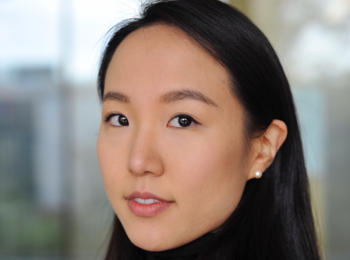Dr. Sophie-Jung Kim

Friedrich-Meinecke-Institut
Global History
Research Associate and Lecturer (Wissenschaftliche Mitarbeiterin)
Global and Transnational History, History of Religion and Ideas, Modern South Asia
Sprechstunde
Please get in touch by email to schedule a time. Meetings will take place via telephone or Webex.
Sophie-Jung Kim is a postdoctoral fellow of the Emmy Noether Research Group, Reaching the People. Before joining this group, she was a postdoctoral fellow at the Center for Global History, Freie Universität from 2018-2019. She received her Ph.D in history from the University of Cambridge (January 2018), where she was a Smuts Cambridge scholar. She holds her B.A in International Studies from the Johns Hopkins University, and M.Phil in Modern South Asian Studies from the University of Oxford.
Her doctoral thesis, ‘Rethinking Vivekananda through Space and Territorialised Spirituality, c. 1880-1920’ was nominated for the Prince Consort & Thirlwall Prize by the Faculty of History at the University of Cambridge.
Prior to working at the Center for Global History at FU, she taught world history courses at the University of Cambridge and King’s College London (2017-2018).
Freie Universität Berlin
'Reaching the People: How to Write Global Histories of Communication' (2019-2020, MA in Global History)
University of Cambridge
1:1 Supervision on topics: 'Nationalism, Liberalism, Radicalism--Global Intellectual Histories of the 19th Century', 'India: Partition and Independence', 'South Asia since 1947' (2017-2018)
'Historical Argument and Practice' seminar series on topics: 'Global and Transnational History', 'Nations and States', 'Religion', 'Race' (2015-2017)
King's College London
'World History from 1870s-2000s' (2017-2018)
Sophie-Jung Kim is a historian of transnational ideas and religion in the long nineteenth-century. Her research projects are inspired by three questions: how ideas move and evolve from one place to another; how transnational places and spaces create new or change old ideas; and how we can locate “Asia” outside its geographical boundaries. By asking these questions, she approaches her geographical focus on South Asia from multiple points—from local roots to international events and global publics.
She currently works on two monograph projects. Her first monograph, Rethinking Vivekananda through Space and Territorialised Spirituality, c. 1880-1920, re-examines the life and ideas of the highly contentious Hindu monk, Vivekananda. The existing debate surrounding Vivekananda has primarily focused on categorizing the monk as either a Hindu nationalist or universalist. Rather than placing him in a conceptual mould, this book reveals the mechanics of his ideas and becoming by analyzing the places he occupied and the spaces he produced. Shifting the focus away from Vivekananda’s thought to his surroundings, the book introduces a constellation of places beyond the dominant geopolitical frameworks of the nation and empire that contributed to the making of Vivekananda, his ideas, and modern spirituality.
Expanding our horizon beyond Vivekananda to his surroundings also leads us to widen our understanding of internationalism. If existing scholarship on internationalism has predominantly focused on state-sponsored conferences and political actors, the book introduces new sites and creators of global publics—everyday places, small princely states, women’s clubs, unexpected encounters, collaborations, and betrayals. How did Vivekananda’s concept of spirituality challenge social norms and create counterpublics in the USA and India? Who participated in the production of spiritual global publics and why? In probing these questions, the book speaks to a wide range of readers who are interested in new histories of internationalism and the global making of spirituality.
Her second project, From Brotherhood to Humanity: Korea and India’s Forgotten World Order, c. 1880-1950, uses Korean, Hindi, Chinese, and English sources to excavate a new history of Asia and democracy. Existing studies on the historical connections between South Asia and East Asia have centred on India and Japan. Buried under this shadow is the entanglement between Indian and Korean anti-colonial activists, their ideas and struggles throughout the late nineteenth and early twentieth century. To uncover this history, Sophie-Jung surveys the discourse of brotherhood, fellowship, and humanity that Indian and Korean anti-colonial actors evoked in their transnational social organizations, cultural and religious international events, and non-violent mass protests. By bringing to the surface the parallel journey of Indian and Korean decolonization, this project seeks to de-centre our understanding of internationalism, global publics, and democracy from the dominant west-centric frameworks, while introducing a new geography of Asia.
Sophie-Jung H. Kim, ‘An International Event and Its Multiple Global Publics: The Parliament of the World’s Religions (Chicago, 1893), and Vivekananda’, in Global Publics: Their Power and Their Limits, 1870-1990 eds. Valeska Huber & Jürgen Osterhammel (Oxford: Oxford University Press, 2020).
Journal ArticleSophie-Jung Kim, Alastair McClure, and Joseph McQuade ‘Introduction: Making and Unmaking Nations in World History’, History Compass 15:2, February 2017.
Editor of Journal Special Issue‘Making and Unmaking the Nation’, History Compass 15:2, February 2017.
Book review(January 2018) Sophie-Jung Kim, Review of The Emergence of Globalism by Or Rosenboim, Journal of Global Intellectual History.






